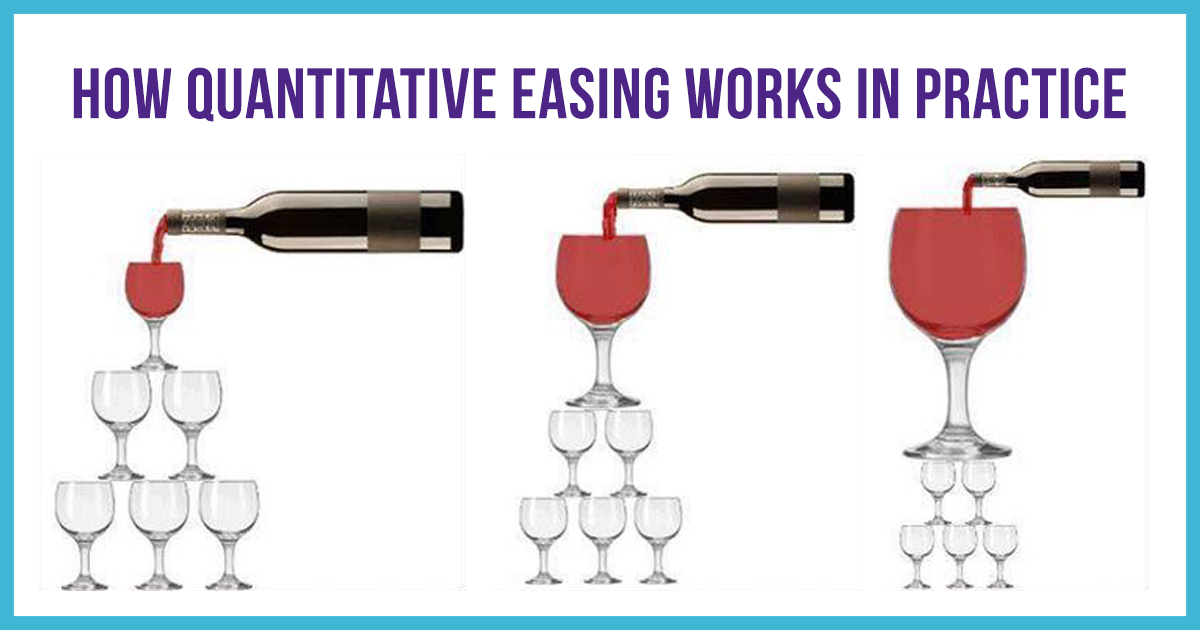In its annual report, the European Central Bank has proved that its quantitative easing programme increased the wealth of the richest.
Since the inception of the quantitative easing programme in the Eurozone, it was clear that such a programme would not only have limited effects on growth and inflation, but it would also carry important unintended consequences.
In particular, quantitative easing almost automatically increases wealth inequality.
This is because of how financial markets work: a sudden rise in demand for certain products or services, (or more relevantly here: financial assets) automatically provokes a rise of prices if there is no corresponding increase in the supply for those products or assets.
By design, quantitative easing (QE) increases asset prices. When central banks inject a massive amount of liquidity to purchase sovereign bonds, it pushes up the value of those bonds. It also affects other financial markets segments too, as QE also fosters demand for other assets, including corporate bonds and equities.
Confused about what all this means? You wouldn’t be the first! Perhaps this is explains better:
The inequality effect of quantitative easing has been acknowledged and evidenced in the past by central banks. In a remarkable paper, researchers at the Bank of England measured the distributive impact of its own quantitative easing programme in 2012, and concluded that:
“By pushing up a range of asset prices, asset purchases have boosted the value of households’ financial wealth held outside pension funds, but holdings are heavily skewed with the top 5% of households holding 40% of these assets.”
QE in the Eurozone benefitted most the top 20% richest people
Now the European Central Bank also did its homework, only to find a similar result. In its annual report, the ECB publishes an exclusive assessment of the distributive impact of QE in the Eurozone. According to the ECB’s research, QE has primarily contributed to an increase of the richest’ 20% by roughly 30%, which is much more than the other segments of the population. The outcomes are best summarized in this chart by the ECB:
While the ECB recognises the existence of this inequality effect, it claims that QE had other positive effects (lowering unemployment and price stability) which partly compensate for the rise in wealth inequality. “There is no better measure to improve equality than to increase employment” repeated Mario Draghi at the ECB press conference on April 27.
We find this argument weak, because its is very difficult to attribute the decrease of unemployment only to the ECB. Other factors may play a much bigger role in this, including structural reforms and national economic policies. In fact evidence suggests that that QE injections have not directly led to higher levels of investment (which would indeed create jobs). On the opposite, the connexion between asset prices and households wealth is pretty clear, especially over a period when the real economy was stagnating.
In other words, the improvement on the employment situation does not invalidate our claim that wealth inequality is caused by the ECB.
But beyond this, the most important point is that other policies, including distributing money directly to citizens as we advocate, would actually reduce inequality instead of the opposite.
Given the length of imagination that ECB policymakers are demonstrating when it comes to designing policies such as TLTROs and QE, it is disappointing that central bankers do not show the same level of imagination when it comes to formulating policies that would reduce inequality.
Note: This article was originally published on the QE for People campaign website. As we are gradually phasing out the QE for People campaign, we are archiving this publication here. For more information, read the history of Positive Money Europe.

